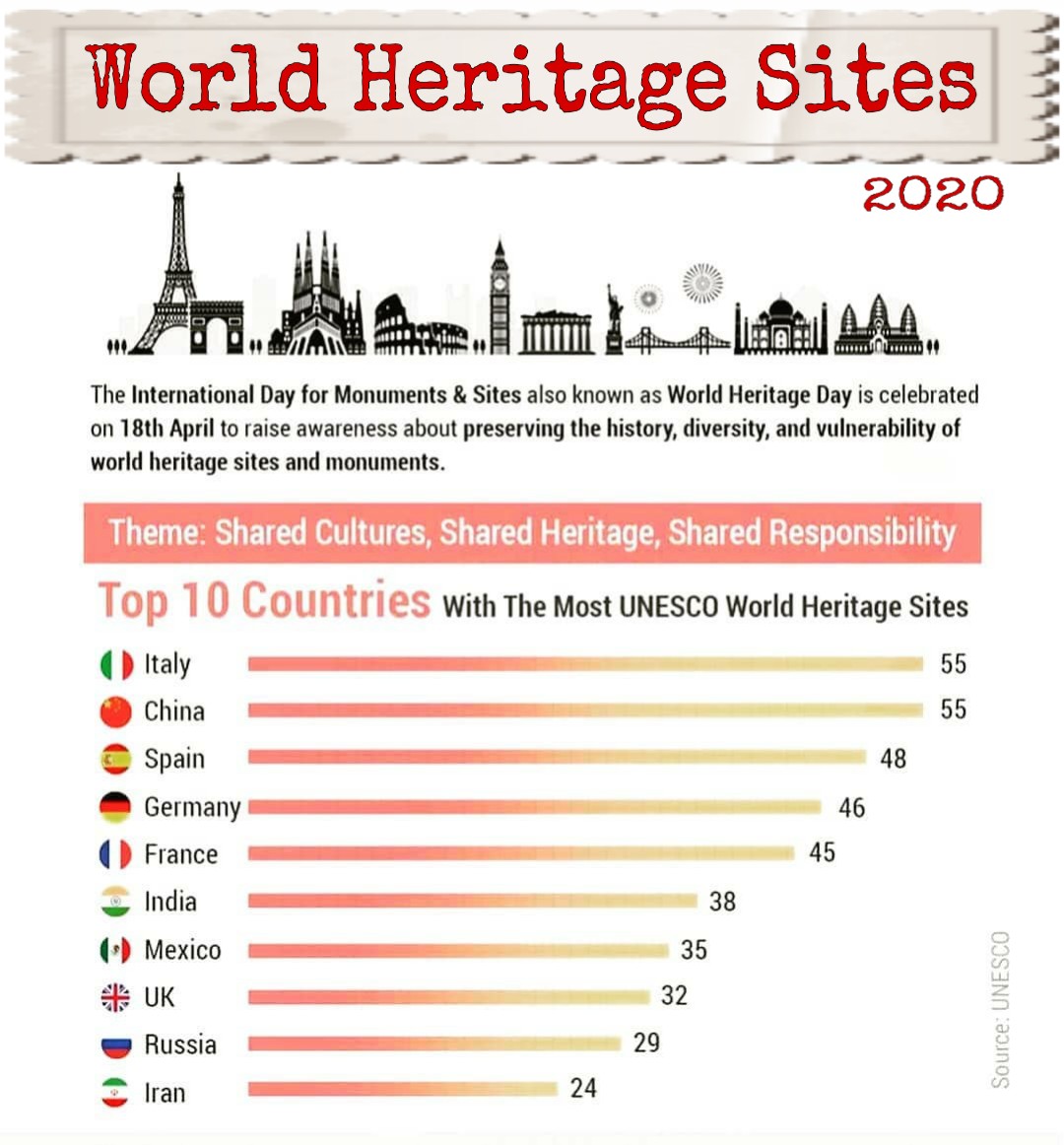


Did you know that Italy has the most UNESCO World Heritage Sites in the world? With a total of 60 sites, including iconic landmarks like The Great Wall and Mogao Caves, China follows closely behind. Germany, France, and Spain also have a significant number of heritage sites, with 54, 47, and 46 respectively. India, Mexico, and the UK share seventh place with 35 sites each, while Russia and Iran also make it onto the list with 32 and 28 sites respectively. From the exquisite Taj Mahal to the mysterious Mount Fuji, these countries are home to some of the most awe-inspiring places in the world.
Introduction
The United Nations Educational, Scientific and Cultural Organization (UNESCO) established the World Heritage Convention in 1972 to identify, protect, and preserve cultural and natural sites of outstanding universal value. These sites represent the diverse history, cultures, and natural wonders of the world.
Italy: The Country with the Most UNESCO World Heritage Sites
Boasting a remarkable 60 UNESCO World Heritage Sites, Italy reigns supreme in this prestigious category. From the iconic Colosseum in Rome to the breathtaking ruins of Pompeii, Italy's rich cultural heritage is showcased in its numerous historical monuments, palaces, and cities.
Other Notable Countries with UNESCO World Heritage Sites
China, with 55 sites, is a close second to Italy. Notable sites include the Great Wall, the Forbidden City, and the Mogao Caves. Germany (54 sites), France (47 sites), and Spain (46 sites) also rank among the top five countries with the most World Heritage Sites.
Top 5 FAQs and Answers
1. What are the criteria for a site to be designated as a UNESCO World Heritage Site?
UNESCO evaluates sites based on ten selection criteria, including outstanding universal value, authenticity, and integrity. The site must also have a management plan to ensure its preservation.
2. How many UNESCO World Heritage Sites are there in the world?
As of 2023, there are 1,154 World Heritage Sites in 167 countries.
3. What is the oldest UNESCO World Heritage Site?
The Rock-Hewn Churches of Lalibela in Ethiopia, dating back to the 11th and 12th centuries, are the oldest World Heritage Site.
4. What is the youngest UNESCO World Heritage Site?
The Archaeological Site of Nalanda Mahavihara in India, inscribed in 2016, is one of the youngest World Heritage Sites.
5. What happens if a World Heritage Site is damaged or destroyed?
UNESCO provides assistance to states in the restoration and preservation of damaged or destroyed World Heritage Sites. The organization can also remove sites from the World Heritage List if they fail to meet the necessary criteria for protection.
Conclusion
UNESCO World Heritage Sites represent the shared cultural and natural heritage of humanity. They inspire awe, foster understanding, and serve as a reminder of the importance of preserving our planet's treasures for future generations. Italy's remarkable contribution to this list showcases the enduring legacy of its rich and vibrant history.

During the Emerging Science Technology and Innovation Conclave, PM Modi announced the launch of the Rs 1 lakh crore Research, Development and Innovation Fund. This fund, under the Department of Science and Technology, aims to encourage private sector investments in R&D to drive India's vision of becoming an innovation-driven nation. With this fund, India's R&D expenditure has doubled in the last decade and the country now has the world's third-largest startup ecosystem. PM Modi also highlighted how India's domestic capability has accelerated during the COVID-19 pandemic due to its successful digital public infrastructure.

A stampede at the Kasibugga Venkateswara Swamy Temple in Andhra Pradesh has left 10 dead and two injured. The temple had recently reopened and was experiencing high footfall due to a festival. Home Minister Vangalapudi Anitha has ordered a thorough investigation into the causes of the tragedy and has promised strict measures to prevent similar incidents in the future.

India and the United States have strengthened their already strong ties by signing a 10-year framework for their major defense partnership. The agreement, signed during a bilateral meeting between the two countries' defense ministers, emphasizes the importance of this partnership in maintaining a free and open Indo-Pacific region. This marks a significant step in solidifying the bond between India and the US in the defense sector.

In preparation for a major tri-service military drill, India has issued Notices to Airmen (NOTAM) for the entire northeastern region that borders China, Bhutan, Myanmar, and Bangladesh. The first set of exercises will commence in November and continue through January, signaling enhanced operational readiness for the Indian Air Force (IAF). This move is significant as the Northeast remains a sensitive theater, making up the boundary with four countries, including China. The upcoming IAF exercises aim to strengthen India's air dominance, effectively preparing for any potential challenges along the western frontier with Pakistan.

India will conduct a 10-day military exercise in Rajasthan and Gujarat involving the Army, Air Force, and Navy to showcase its operational readiness following Operation Sindoor earlier this year. The exercise, announced through a NOTAM, features advanced military technologies and emphasises the integration of speed, firepower, and precision in desert warfare conditions. It comes amidst heightened tensions with Pakistan and a renewed focus on maintaining military readiness along the border.

Jammu and Kashmir police have filed an FIR against a group of Christian missionaries in Kathua district for allegedly attempting religious conversions through financial incentives. This comes after a video surfaced online showing the missionaries being attacked and their vehicle vandalized by villagers. The incident has sparked outrage and protests from local Hindu groups, demanding action against the accused missionaries. One accused, Ravindra Singh Thela, has been arrested while the main accused, Vivek Soni, is still at large. The police have also suspended eight personnel for failing to stop the attack.

US Vice President JD Vance, who converted to Catholicism in 2019, has revealed that he hopes his Hindu-raised wife, Usha Vance, will eventually embrace Christianity. However, he clarifies that their interfaith marriage is built on mutual respect and understanding, and that Usha has complete freedom of choice in matters of faith. The couple has found a balanced way to manage their interfaith household, with their children attending a Christian school and given the choice to be baptized.

US President Donald Trump has expressed optimism about reaching a trade deal with China "pretty soon" after a meeting with Chinese President Xi Jinping in South Korea. In addition to announcing lower tariffs on Chinese imports, Trump also stated that the issue over US access to rare earths has been resolved. However, there has been no official response from Beijing and the final decision on the sale of Chinese-owned TikTok's US operations is still pending. Analysts see these developments as a breakthrough in the ongoing trade tensions between the two countries. Our correspondents provide insight on the discussions between the two leaders and speculate on why Xi may have felt confident walking into the meeting.

At the Asia-Pacific Economic Cooperation (APEC) Summit in South Korea, Chinese President Xi Jinping and US President Donald Trump met for their first in-person talks in several years. Despite past frictions, Xi called for closer cooperation between the two largest economies in the world, emphasizing the importance of being "partners and friends." Acknowledging Trump's peace efforts in the Middle East, Xi commended his contributions and praised him as a "tough negotiator." Trump also expressed optimism for a productive discussion on trade and global security.

In a historic event, Prime Minister Shri Narendra Modi addressed the Global Maritime Leaders Conclave and chaired the Global Maritime CEO Forum at India Maritime Week 2025 in Mumbai, welcoming participants from over 85 countries. With major shipping giants, startups, policymakers, and innovators in attendance, the summit showcased India's advancements in the maritime sector, such as the replacement of outdated colonial laws with modern ones and the recognition of large ships as infrastructure assets. Amidst global tensions, India stands as a symbol of strategic autonomy and inclusive growth, ready to take on a leading role in the world's rough seas.